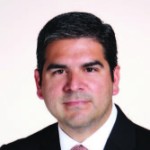
David Montiel
Director of Originations, White Oak Commercial Finance
40 Under 40 Category: Business Development
Biography:
David Montiel serves as director of originations for White Oak Commercial Finance with primary responsibility for originating and structuring ABL opportunities. David has over 15 years of commercial finance experience in underwriting, risk management, field audit, and originations. Previously he managed cross-border trade finance facilities with financial institutions and exporters in Latin America for CIT Commercial Services. He holds a B.A. in business administration from the McColl School of Business at Queens University of Charlotte and is an active member of the Secured Finance Network, Turnaround Management Association, and the Association for Corporate Growth. David lives in Charlotte with his wife and two daughters where he is an active parishioner at St. Matthew Catholic Church. He enjoys traveling, getting involved in his daughters’ school activities and the club swim team.
What is the best professional advice you have been given and how have you implemented it?
he best advice was to always keep learning, be open to take on more responsibility, and value the opportunities to interact with senior members of the organization. As a young professional, it is important to have a role that provides ample learning opportunities and exposure to new situations. In my case, after finishing the management training program at CIT, I decided to work in field exams because it provided the opportunity to get exposure to different companies every week and observe their unique business models, management styles, accounting systems, collateral, and financial situations. I also enjoyed the opportunity to interact with the portfolio management and credit team to address any issues that I would find during the exams. It was interesting to see how they would approach difficult situations and my challenge was to follow their logic to arrive at the same conclusion. After a few years, it was time to expand beyond field exams so I asked for other opportunities within the company and was able to work in originations and portfolio management within the international group. Here at White Oak we are fortunate to have opportunities to contribute in many ways to the overall success of the organization, and our senior management team encourages everyone to pitch in and get out of their comfort zone to keep growing professionally.
What role has mentoring played in your career?
I was very fortunate to have a great mentor at CIT. Coming into the professional world as a young undergrad was challenging because the initial ambition and drive to succeed can be tamped down by the routine tasks that have to be done and that young professionals sometimes end up in charge of (i.e., verifications, collateral reconciliations, customer credit checks, etc.) My mentor always provided much needed perspective into how valuable those tasks are to the overall health of the portfolio. He sought opportunities to give me exposure to the senior credit team, attend credit committee meetings, and participate in underwritings and large/complex field exams. He outlined a career path that would be available to me in time, and that may have been a reason why I decided to stay in commercial finance.
How do you think the commercial finance industry can attract more young professionals?
We need to present our industry as a vital part of the financial markets, particularly the middle market. There are many recognizable companies that rely on the solutions provided by the commercial finance industry, be it ABL, factoring, or supply chain/trade finance. When young professionals see the kind of companies they’d be working with, they may open up to careers in our industry. Then we could explain the varied situations that a company may be facing, such as rapid organic growth, roll-up acquisitions, leveraged buyouts, turnarounds, seasonal demands, change in industry dynamics, etc. The opportunity to analyze these varied situations may be appealing. It’s also important to lay out a career path so they understand that there are many ways to contribute and grow within our industry. Lastly, I would add that it’s important to give young professionals increasing responsibility and keep them challenged. If they get bored in their position, it is only normal that they would try to find another role, and we can’t blame them for that.
The Secured Lender

SFNet's The Year Ahead Issue


